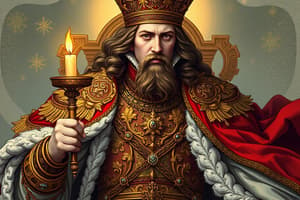Podcast
Questions and Answers
Which scenario is most like the reason why revolutions started in nineteenth-century Europe?
Which scenario is most like the reason why revolutions started in nineteenth-century Europe?
- Citizens opposed global trade.
- Citizens conclude that their elected leaders are too lazy.
- Citizens wanted to preserve the monarchy.
- Citizens desire more political representation. (correct)
Liberals tended to belong to the?
Liberals tended to belong to the?
middle class
Did Friedrich von Gentz approve of the Congress of Vienna's actions?
Did Friedrich von Gentz approve of the Congress of Vienna's actions?
False (B)
Who had a successful revolution in the early nineteenth century?
Who had a successful revolution in the early nineteenth century?
What did the Congress of Vienna aim to ensure?
What did the Congress of Vienna aim to ensure?
Which statement best summarizes the early nineteenth-century revolutions that moved through Europe?
Which statement best summarizes the early nineteenth-century revolutions that moved through Europe?
The best example of cause and effect after the Congress of Vienna is?
The best example of cause and effect after the Congress of Vienna is?
The Congress of Vienna gave Austria more territory in?
The Congress of Vienna gave Austria more territory in?
What were two results of the Congress of Vienna?
What were two results of the Congress of Vienna?
Which statement best illustrates the theories of Prince Klemens von Metternich?
Which statement best illustrates the theories of Prince Klemens von Metternich?
Flashcards are hidden until you start studying
Study Notes
Age of Revolutions in Europe
- Many revolutions in nineteenth-century Europe were driven by citizens’ beliefs in ineffectiveness of their elected leaders, but revolutions did not stem from mere frustration with laziness.
- Liberal movements predominantly consisted of the middle class, advocating for political reforms and civil liberties.
- Friedrich von Gentz criticized the Congress of Vienna for disguising its true aim—dividing land among victorious powers rather than genuinely reconstructing Europe’s political landscape.
- The French successfully led a revolution in the early nineteenth century, changing their government and societal structure.
- The Congress of Vienna sought to restore peace and stability across Europe post-Napoleonic Wars, preventing further conflicts.
- Early nineteenth-century revolutions across Europe largely ended in failure, with only a few achieving significant change.
- The Congress of Vienna resulted in Austria gaining more territory, specifically in Italy, altering the balance of power in that region.
- Outcomes of the Congress included the restoration of the French royal family and the incorporation of Poland into the Russian Empire.
- Prince Klemens von Metternich's ideology centered around the idea of returning absolute power to monarchs, opposing liberal movements and revolutions.
Studying That Suits You
Use AI to generate personalized quizzes and flashcards to suit your learning preferences.



